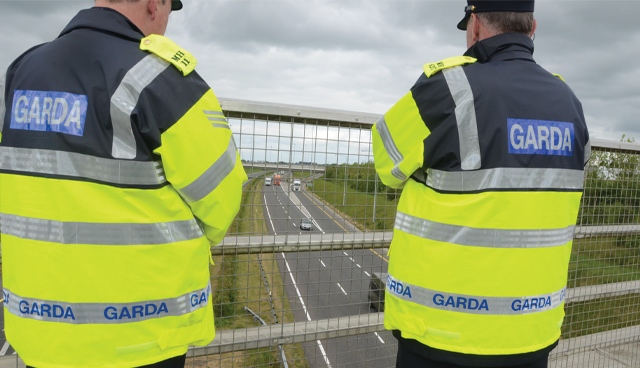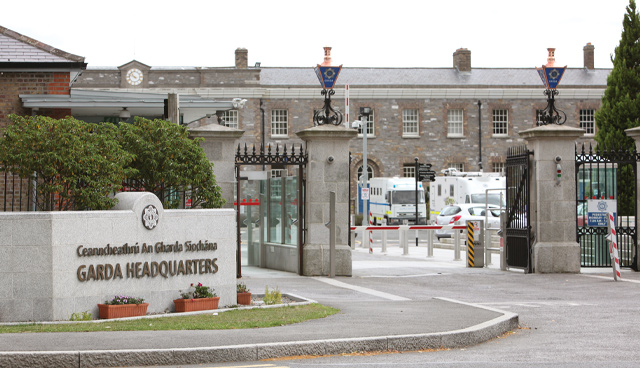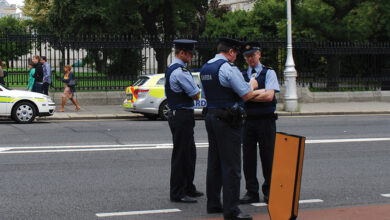Garda reform

In March 2020, just days before the Covid-19 lockdown took effect, Garda Commissioner Drew Harris announced the latest phases in the reform of An Garda Síochána, which seeks to decentralise policing power and place an emphasis on community policing.
The phase announced by the Commissioner in March began the introduction of the Garda Operating Model, which will see more frontline Gardaí recruited and a greater emphasis placed on community policing. The phased introduction will see the allocation of chief superintendents and superintendents to each of the 19 Garda divisions; these allocations come after 640 Gardaí had been redeployed from administrative roles into the frontline.
These changes have all been made as part of the implementation plan that followed the publication of the Commission on the Future of Policing in Ireland’s 2018 report. The new number of divisions are also a result of these reforms, with the previous numbers of 28 divisions within six regions having been reduced to 19 divisions in four regions, as was originally announced in August 2019.
The six regions of Dublin Metropolitan, West, South, South East, East and North have now been condensed into Dublin Metropolitan, North-West, South-West and East. The 19 divisions within these regions will all have chief superintendents allocated to them, with those chief superintendents acting as de facto commissioners for their area, allowing the Garda force within their divisions to act as miniature autonomous police forces.
These changes are central to the overall attempt to decentralise power within An Garda Síochána and have decision making mover from Garda Headquarters into communities. The reduction in the number of regions and divisions has meant that areas and former divisions have merged. In the East, Meath and Westmeath have merged, along with Laois-Offaly and Kildare, Wicklow and Wexford and Kilkenny-Carlow and Waterford. Kerry, Limerick and Cork city all remain as they were in the South-West, with Cork North and Cork West merging, along with Tipperary and Clare. Galway will remain as is in the North-West, while Mayo merges with Roscommon-Longford, Donegal with Sligo-Leitrim and Cavan-Monaghan with Louth. All Dublin divisions have been untouched.
Chief superintendents taking control of their divisions will have four subordinate superintendents, two of whom will be responsible for public engagement, one heading up criminal investigations and one responsible for performance assurance across all areas of police work. It is said that the key function of the superintendents tasked with public engagement will be constant communication with community leaders and organisations in order to ensure that local policing is in line with the on-the-ground reality within the communities.
Chief superintendents will have the power to design bespoke policing plans for their divisions and allocate their resources as they see fit as a result of the power that has been devolved to them from the Phoenix Park as part of a concentrated effort to deliver more community-focussed policing that responds to the concerns of residents rather than previous one-size-fits-all model that had been decided in Dublin.

Harris has outlined his reasoning for reducing the number of divisions, saying that having 28 had weakened policing in each of the divisions. An example he cited was that of small numbers of detectives with an expertise in sex crimes being constantly pulled into other types of criminal investigations within their divisions due to a lack of Garda numbers. Under the new plan, Gardaí with expertise in sex crime investigations will create a dedicated sex crime unit within their enlarged division once amalgamations have been competed, allowing previously stretched Gardaí to focus on their areas of expertise. This will mark the first time Gardaí will be assigned to only investigating sex crimes, and this model will be repeated across all crime types, with specialist teams dedicated to specialist areas.
In an effort to have more Gardaí on the frontline, Garda administrative offices and processes have also been majorly overhauled. Before the reforms, there were 124 administrative offices offering support to senior Gardaí in the regions, divisions and districts; most of these 124 offices were staffed by Gardaí. Under the reforms, the number of these offices will be drastically reduced to 19, one for each division. The offices will now be staffed by civilians, under the stewardship of an assistant principal officer, and will manage human resources, expenditure, procurement, sick and annual leave, personnel transfers and other staffing matters.
Civilians entering these offices will have the necessary training and expertise to relieve Gardaí from deskbound jobs. It is also hoped that the appointment of experienced professionals to oversee the business services in these offices will help to professionalise the service, which manages the affairs of up to 800 personnel per division.
Garda recruitment has also been accelerated in a bid to further increase the number of frontline Gardaí, with a target of 15,000 sworn members – a record if it is reached – within two years. The result of the civilianisation of the administrative offices means that 1,800 Gardaí will be moved into frontline work such as beat patrolling and criminal investigations.
Harris has said that extra numbers on the ground will mean all areas getting a better policing service, one that is more visible on the streets. An example of this is the amalgamation of two regions within Cork city, which led to the doubling of the number of Gardaí in community policing capacities to 440.
Along with the additional 1,800 new frontline Gardaí, 75 new inspectors and 150 new sergeants are also being put in place with the aim of ensuring that the larger number of rank-and-file Gardaí will have the required supervision. Inspectors will now be tasked with the management of most Garda stations, a responsibility that had previously lain with superintendents. The reorganisation will result in a slimming down of the organisation from the top, with the loss of chief superintendents designed to be minimal, but larger losses at the superintendent level are almost certain with the aim to create more rank-and-file Gardaí, inspectors and sergeants.
Speaking after the announcements in August 2019, Pat Ennis, General Secretary of the Garda Representative Association said that he had been assured that “the plan was not necessarily the last word on the issue” and the Association of Garda Superintendents described the reorganisation as “ill-advised”. Despite then-Minister for Justice Charlie Flanagan backing the plan, saying it would “reduce bureaucracy” and “delver an improved, more consistent, highly visible policing service in communities”, it appears that Drew Harris’s next challenge will be getting buy-in down the ranks as he seeks to deliver on reforms that have been mooted long before he took up his post as Garda Commissioner in September 2018.





